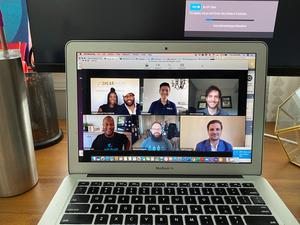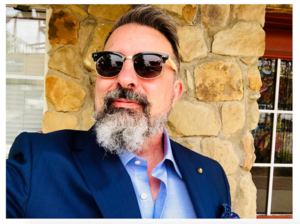SURVIVR and InVeris Training Solutions came together over competing bids.
In the first half of 2020, both bid to land a $2.6 million contract to provide systems and equipment for California’s Commission on Peace Officer Standards and Training. InVeris landed the deal, but SURVIVR’s tech had piqued the interest of InVeris' CEO Al Weggeman.
Over the summer, the Georgia-based virtual and live-fire weapons training systems firm with a nearly century-long history, acquired SURVIVR, the Dallas startup that operates in a similar space with its virtual reality platform.
At the time of the deal, InVeris had a headcount of around 400. SURVIVR had about 11. Both companies declined to disclose the financial terms of the deal, as well as revenue figures at the deal's closing in August.
The company sees itself uniquely positioned for the changing law enforcement landscape, in which practices have come under scrutiny following the protests sparked by the police killing of George Floyd last year. SURVIVR CEO Brian Hoang said that’s because the company’s platform focuses on a holistic approach to weapons training, rather than focusing on the marksman aspect of it. Through its VR tech, users are able to simulate encounters they would have on the job, working through ways to de-escalate the situation.
“One way to think about it is we don't really focus on how to pull the trigger… where we're headed is focusing on when and why the trainee pulls the trigger, to foster critical thinking around that concept,” Hoang said. “The more repetition that they get, the more likely they are to make the right decisions when they encounter these same scenarios on the street.”
SURVIVR was launched in 2018, the same year it took home the third-place prize at UT Austin’s DisrupTexas Competition and the No. 1 spot at UT Dallas’ Big Idea Competition. The company is also a graduate of the Techstars Austin accelerator program.
InVeris was initially formed out of live-fire equipment systems company Caswell International that was acquired by publicly traded British firm Meggitt plc (LSE: MGGT). It later combined it with another portfolio company to form Meggitt Training Systems, then sold to Washington, D.C.-based private equity firm Pine Island Capital Partners in a $146 million deal last July. In March, now as InVeris, it named Weggeman CEO.
“There's a lot of growth opportunity here as we continue to roll out better features. Going forward, SURVIVR brings a lot of that incremental and continued build of that system and that capability. We continue to see a strong demand for the product in the market, and I think the growth opportunities are significant,” Weggeman said. “Both teams are subject matter experts… so taking that and rapidly innovating and deploying it is absolutely what the team in Dallas does well. They're very good at creating content capability very quickly with the end-user in mind.”
Hoang and Weggeman shared more with NTX Inno in an interview.
Was this always SURVIVR’s exit strategy?
Hoang: Exit strategy is something that's always in the back of my head. And it's something that I should be able to articulate as potential options and outcomes that we would have as a company. But really, the focus at any point in time isn't on exiting, it’s building a strong business, serving our customers, building a healthy culture for the company and growing that as rapid and properly as we can. Along the way, if the right opportunity presents itself… then we'll consider it on a case-by-case basis.
We had several potential outcomes. That was kind of like a hypothesis. I wouldn't say that we started the company… to be acquired. We are here to improve public safety. We want to create revolutionary training technologies for public safety, law enforcement and military. This is our path to do so.
What made SURVIVR attractive to InVeris?
Weggeman: It was very important that when you take a larger company, and you have a highly entrepreneurial business, you don't want to wreck that. What we've done is take a look at the technology the customer requires,… look at the mutual customer base and continue to work on improving the product and the roadmap. We already have additional launch cycles of new product that we're looking to bring out.
What trends are you seeing in the industry?
Weggeman: What's transpired over the last couple of years is a real shift… to situational training, addressing things like de-escalation. How do you deal with someone who may have a mental health issue or maybe impaired? VR is just a perfect training tool for that. It allows you to go through… different situations many times over. It’s a very cost-effective way to run… that allows you to do a lot of training quickly. You can take someone down a lot of different scenarios and paths so that when they actually face that in the community, they'll have already seen some of this and hopefully will be able to respond in a better way that serves our community.
Tell us more about your new role at InVeris.
Hoang: My job is to represent the voice of the customer and to oversee what gets built, in what priority and why. I sit in the middle between all the different stakeholder departments, including engineering, sales and operation. It’s balancing the capabilities and resources of the organization while making sure that we are always deploying the best and right features of products for the customers.
This interview has been edited for brevity and clarity.








